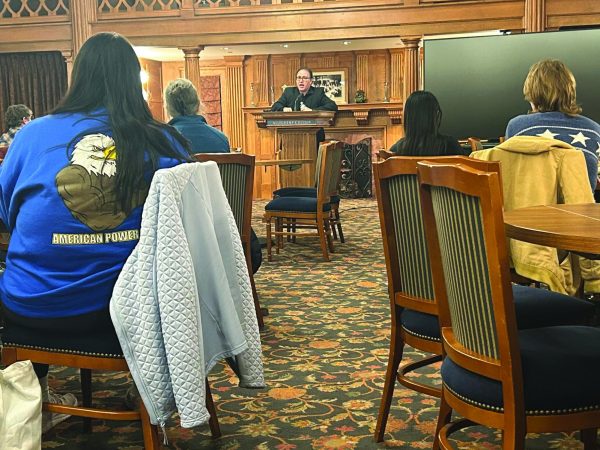Despite the Disney magic ‘Encanto’ lacks depth
“Encanto” was shown recently in the Shafer Auditorium in the Henderson Campus Center. Being the movie person I am, I dragged some friends along to see it with me. The movie was a blast on the big screen and my friends had an especially good time listening to the songs on the auditorium speakers. From my perspective, it was a hit with the crowd and left a lot of smiling faces. All this made me all the more excited to review this undoubtedly fun movie.
“Encanto” is a movie about a magical family in which each member, except for our main character, Mirabel Madrigal, is given magical powers. The magic, born of a tragedy before Mirabel is born, creates a refuge for the family Madrigal to live in called the Encanto. Also, the magic manifests itself physically in the form of a house, which the family warmly calls “Casita,” and the sparkly flame of a candle that does not go out. Soon though, the magic that has blessed the family begins to weaken and it is up to Mirabel, despite not receiving a magical “gift,” to save the magic and the Encanto.
The House of the family Madrigal presents itself immediately as one of the smartest and brightest parts of “Encanto.” Casita’s conscious interaction with the family makes for some really fun and unique sequences that set the rest of the movie up really playfully. Casita really shines, though, with its magic rooms, specifically made for each gifted family member. These rooms can be as fantastical, outlandish and huge as they need to be depending on the traits and powers of the family member. Watching Mirabel enter and explore the rooms of Casita is a really smart way to give the movie a large and adventurous story while still keeping a small and focused scale on the magic, the house and the family.
The songs of “Encanto” were all written by Lin-Manuel Miranda and it is clear he is stretched too thin after creating three other movies in 2021 alone. The first song of “Encanto” is entitled “The Family Madrigal,” and while catchy and fun, I feel it should have been cut entirely. The song is completely expository and uses children asking direct questions of Mirabel as a vehicle for the audience to learn about the world of “Encanto”. If the song was cut from the movie then the audience would have gotten to experience the imaginative world of “Encanto” with a greater sense of wonder and gain a greater satisfaction in learning about it. The audience, in exploring this new world, could have felt like children again. Instead, though, the movie reduces us to children in explaining the marvel of “Encanto” directly. The other songs of the movie do not fare much better. Instead of using its songs to reinforce or propel the story, “Encanto” uses music too often as a crutch to explain away new aspects of the movie or its characters. A few songs do break this pattern though, including “Encanto’s” highlight, “We Don’t Talk About Bruno.” “We Don’t Talk About Bruno” is not only, in my opinion, the best song in this movie musically, but it is also the best in terms of story. The song, using anecdotes, overlapping voices and a stronger bass, builds a shrouded suspense and curiosity around Bruno that makes the audience excited for the rest of the movie and Bruno, especially.
Bruno, when he inevitably comes into play, also serves as a highlight among the cast of characters. Both him and Mirabel are super likable. They are funny, insecure and quirky in ways that feel natural and are not only traits to relay a message. Similar things can be said about Abuela Alma Madrigal, the grandmother and soul of the family. Although she is not funny or quirky, and is often cruel to Mirabel because of her lack of powers, she offers a real depth to her traditional ways and it is always clear she is trying to do what’s best for the Encanto. Abuela offers a really great perspective on tradition which I have not often seen in movies aimed at children. Mirabel’s sisters Isabela and Luisa also offer great perspectives but I cannot say that they hold quite the same profundity that Mirabel, Bruno and Abuela do. Both characters are extremely gifted and are seemingly perfect on the surface, but suffer from understandable insecurity under the weight of expectations. Obviously these are lovely traits for characters to have but they still come up flat for me because their feelings are, once again, explained directly through song. Isabela and Luisa are powerful characters and they should’ve been given the proper time to let their feelings build and be revealed. Also, the two sisters are essentially the same character, just with different powers, making their character arcs feel more predictable and less profound. Regardless of how I feel about them though, there is no doubt the characters of “Encanto” will do a lot of good for the children watching them.
The sisters, and most other characters with powers in the movie, will offer a lot of solidarity for children who have been given the “gifted” label. These labels can put a lot of expectation and pressure on children so it is good to have characters like Luisa and Isabela to show them that it is okay to be insecure or anxious. I do not think it is a coincidence that the powers in “Encanto” are called “gifts.’’ However, these sorts of powered characters seem to be everywhere nowadays, especially in movies. This is why I think Mirabel is the perfect protagonist for “Encanto.” She shows to children directly that even when surrounded by super powered role models, it does not take magic to be a hero. Abuela will also help children gain new perspectives on their role models because of her surprisingly mature look at generational trauma. This may help children who are, as Mirabel is, negatively affected by older generations being tied to tradition.
Healthy messages and representation can only do so much for a movie though, and I believe “Encanto” is too reliant on these things, as well as its songs, to win the audience over. To me, because of all the explaining it does, “Encanto” feels more like a lesson than a movie. It feels like the plot just serves to sell its message rather than to provide a profound adventure for the characters to naturally find the end of their arcs. If more energy was put into the plot then this movie would’ve been just as good for adults as it is for children. Instead though, “Encanto” uses relatability, music and visuals as crutches to keep the audience entertained through the unmemorable and messy plot.
“Encanto” as a whole is a beautiful movie that has a lot to do and a lot to say, however it is also a movie that gets so wrapped up in its message and songs that it forgets to create a plot that makes the audience — especially its adult audience — take the message seriously. It does a great job making the audience hear the message, but it forgets to make us think about the message. “Encanto” creates a warm, satisfying feeling when the credits roll, but it does not leave much to think about. I’m excited to show this movie to my kids one day, but I do not think I would show it to my friends. If you have not, I encourage you to watch it anyway though, and to form your own opinion.






